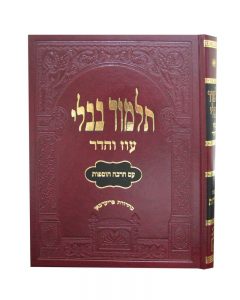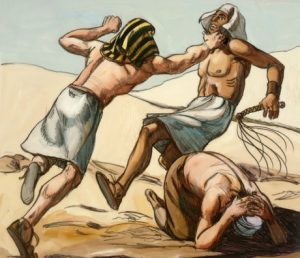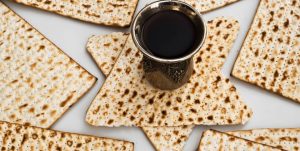Emor 2018: The Proper Brocho (Blessing) on Matzo
by devadmin | May 3, 2018 9:32 pm
The Proper Brocho (Blessing) on Matzo
Following two consecutive double headers, welcome to Emor, a single parsha we’ll learn this week. Ober settle in: it’s a biggie and chock full of mitzvois, mamish. In fact, just so that you can sit at the shabbis tish and say something intelligent, you should know that Emor has 63 of the 613 mitzvois and that’s mamish over 10%. How can we cover 63 mitzvois which include serious mention of just about every Yom Tov, a shout-out to the heylige shabbis and according to some, even Chanukah, in one short overview? Es iz immeyglich (impossible). What to do?
Moreover, Sunday was noch a Yom Tov, one we call Pesach Shaynee (the second Pesach). Had you paid attention in yeshiva instead of thinking about girls, efsher you would have known epes something about this Yom Tov. Seemingly, you are not alone and it appears that this holiday has flown under the radar of even the most enterprising of Yiddin. Even Toirah entrepreneurs who have built empires around the mitzvois and who have perfected celebratory methods to help us mark Pesach by making us spend thousands of dollars on clothing, food, flights, and hotels, have seemingly overlooked this givaldige opportunity; it’s staring them in the face mamish! Is it at all possible that the Oisvorfer has discovered the last mitzvah in the heylige Toirah that has yet to be fully and properly commercialized? Ver veyst. And how does one celebrate this obscure Yom Tov that many never heard of and even fewer celebrate? Ober Raboyseyee, though you know mamish nothing about this Pesach Shaynee, you should recall from learning the heylige Toirah that this topic and its rules, are mamish min-haToirah (found in the heylige Toirah). Ober vus iz iz (what is it)?
Nu, in hyntige tzeytin (in our times), sadly the gantze Pesach Shaynee seems to be gornisht mit gurnisht (a big nothing) with kimat zero practical significance: Pesach Shaynee – literally the Second Pesach- is always marked and celebrated on the 14th day of Iyar, and as we will soon learn, some also observe it on the 15th. Some taka eat leftover matza on this day -zecher L’korbon Pesach (to remember the korban Pesach)- ober most don’t!
 Nu, it so happens that for the first time in his life, the heylige Oisvorfer observed this Yom Tov and did in fact wolf down and entire hand-made shmura matzoh. Why now? Here’s how it went down. In the early afternoon, when he walked into the shul to look for a sefer (holy book), there on the table staring him right in the face, was an entire box, 2.5 pounds worth of shmura matzo. Nu, with the mitzvah mamish talking to him, he chapped one entire beautifully rounded, slightly burned matzo and was about to set it down in order to wash and make the obligatory brochis (blessings) prior to partaking. Ober what happened next? Another Yid walked in, he of Iranian decent and quite observant. He too saw the matzo box and removed one. And then? He blurted out the brocho one typically makes when eating cake, cookies and even pizza, and proceeded to eat the matzo.
Nu, it so happens that for the first time in his life, the heylige Oisvorfer observed this Yom Tov and did in fact wolf down and entire hand-made shmura matzoh. Why now? Here’s how it went down. In the early afternoon, when he walked into the shul to look for a sefer (holy book), there on the table staring him right in the face, was an entire box, 2.5 pounds worth of shmura matzo. Nu, with the mitzvah mamish talking to him, he chapped one entire beautifully rounded, slightly burned matzo and was about to set it down in order to wash and make the obligatory brochis (blessings) prior to partaking. Ober what happened next? Another Yid walked in, he of Iranian decent and quite observant. He too saw the matzo box and removed one. And then? He blurted out the brocho one typically makes when eating cake, cookies and even pizza, and proceeded to eat the matzo.
The Oisvorfer was perplexed. Ober, without asking questions figured azoy: if that mizonos brocho sufficed for the Yid with the bigger yarmulke who recites tehilim daily and is otherwise a good guy, it was certainly good enough for the not so heylig (at times) Oisvorfer, and shoin. For the first time in his life, the Oisvorfer ate matzo without the brocho of hamoitzee. Admittedly, the Oisvorfer has -on occasion- enjoyed matzo and other products without any blessing, ober looks forward to doing t’shuva yearly on Yom Kippur. The RBSO understands.
Ober why taka did the Iranian Yid dispense with handwashing and hamoitzee? Shoin, after a bit of research which mamish assuaged the little bit of guilt the Oisvorfer carries for -at times- not making the proper brocho- and or, for not washing his hands when otherwise directed, as it turns out, Sephardic Jews have a custom to make a mizonos (cake brocho) on matzo all year round with the exception of Pesach. Why? Ver veyst? And while the Oisvorfer may have taken the easy way out on the matzo, he does have breaking news: for the first time in his lifetime, he is still -on day 33- counting sefira with a brocho: OMG!
 The bottom line: while the Oisvorfer has for years been carrying guilt over what he believed to be indiscretions, he should be comforted in knowing that he was in the box. Other Yiddin -many more devout- are daily dispensing with hand washing and the hamoitzee before eating matzo. And this past Sunday, for a few minutes anyway, the Oisvorfer became a Sephardi. Shoin, since we mentioned Pesach Shaynee, a few more tidbits just in case you find yourself suddenly enamored with this Yom Tov.
The bottom line: while the Oisvorfer has for years been carrying guilt over what he believed to be indiscretions, he should be comforted in knowing that he was in the box. Other Yiddin -many more devout- are daily dispensing with hand washing and the hamoitzee before eating matzo. And this past Sunday, for a few minutes anyway, the Oisvorfer became a Sephardi. Shoin, since we mentioned Pesach Shaynee, a few more tidbits just in case you find yourself suddenly enamored with this Yom Tov.
According to many (Piskei Tshuvos 492:1) though avada not all, one does not fast on this day, make Hespedim, or a Hakomas Matzeivah. Ober eating is always a good way of celebrating any Yom Tov, Yiddin love to eat, and eating Matza on this day, like the eating of the afikoimon after we’re already good and stuffed at the seder, is our way of remembering the Korban Pesach. Veyter.
And how does one celebrate Pesach Shaynee bazman hazeh (in our times) when sadly we don’t have a Beis Hamikdash? Seemingly for many, efsher even most, but zicher not all, today we mark this day by skipping tachnun during shacharis (morning prayers). This avada makes the people who go to minyan daily very happy; they’re in heaven mamish, because they’ll be getting out exactly 60 seconds earlier. Nu, after long nights at home with the eishes chayil, it doesn’t take much to make the men happy. Ober judging by the smiles on their faces and by the eagerness of so many to yell out – no tachnun- one could be left with the impression that these people epes won the lottery. Is saying tachnun so giferlich? Grada, tachnun, during which one places his head down onto one arm, is a perfect time to check out the latest text and email because chas v’sholom, it should go unanswered for another minute or two. And avada when it comes to Pesach Shaynee and omitting the tachnun, and as excepted, there is avada no consensus on how long we celebrate this joyous holiday in mittin derinin of the gantze sefira period. What’s taka pshat here?
 Says the achroin Rebbe Art Scroll (Yitzchok Yair edition) azoy: some people celebrate this holiday on the 14th day of Iyar and omit the tachnun and some others, those in Golus, also celebrate on the 15th day as well. Givaldig! Ober says another edition of the Art Scroll (RCA) that in some shuls, tachnun is omitted on the 14th of Iyar with no mention at all of the 15th. Nu, depending on which Art Scroll you pick up that day and hold by, might determine if you omit at all, only on the 14th or also on the 15th. Got that? Givaldig! Ober the Shulchan Oruch (Code of Jewish Law), the one sefer we grew up with and which seemed to answer all questions, has no mention at all about skipping tachnun on this day. And like everything else, when it comes to saying or skipping tachnun, it’s not clear. Veyter. Many hold that since they omit and or just glance over the tachnun most days of the year, it would be a chutzpah for them to recite it on Pesach Shaynee. Taka emes!
Says the achroin Rebbe Art Scroll (Yitzchok Yair edition) azoy: some people celebrate this holiday on the 14th day of Iyar and omit the tachnun and some others, those in Golus, also celebrate on the 15th day as well. Givaldig! Ober says another edition of the Art Scroll (RCA) that in some shuls, tachnun is omitted on the 14th of Iyar with no mention at all of the 15th. Nu, depending on which Art Scroll you pick up that day and hold by, might determine if you omit at all, only on the 14th or also on the 15th. Got that? Givaldig! Ober the Shulchan Oruch (Code of Jewish Law), the one sefer we grew up with and which seemed to answer all questions, has no mention at all about skipping tachnun on this day. And like everything else, when it comes to saying or skipping tachnun, it’s not clear. Veyter. Many hold that since they omit and or just glance over the tachnun most days of the year, it would be a chutzpah for them to recite it on Pesach Shaynee. Taka emes!
In order to chap this Yom shtikel Yom Tov and though we are still in sefer Vayikra (Leviticus), we must for a minute skip ahead to Bamidbar (Numbers) wherein we will learn the story about Pesach Shaynee. There we learn azoy: One who was tomay (ritually unclean) was not allowed to bring and partake of the Korban Pesach (Paschal Offering). Says the heylige Toirah (Bamidbar 9:6-11) azoy: a group of Yiddin approached Moishe and Aharoin at the time the first offering was brought (following the exodus). Because they were ritually unclean from contact with a corpse, they were not able to bring the offering. Some say they were the first ever chevra kadisha that carried Yoisef’s bones out of mitzrayim. These Yiddin asked Moishe and Aharoin why they were being prevented from bringing the offering with the rest of the Yiddin, in the proper time? Said Moishe: “stand and hear what the RBSO has commanded you.” Immediately following, the heylige Toirah spells out the laws of Pesach Shaynee, which are seemingly a second chance, and an opportunity for those who missed bringing the Korban Pesach in the proper time (through no fault of their own), to bring this offering, and fulfill this special mitzvah. Poshit giredt (simply speaking): the RBSO gave the Yiddin the opportunity to make-up the mitzvah.
Says the RambaN azoy: all who miss bringing the offering at Pesach have to bring it on Pesach Shaynee. However, only those Yiddin who were in a situation where their inability to bring the offering was beyond their control were exempt from bringing it on Pesach (and therefore are not subject to any punishment). The offering brought on Pesach Shaynee differed in some respects from the one brought on Pesach itself. On Pesach Shaynee, it was permitted to have chometz (leavened bread) in the house. However, the offering, as on Pesach, was to be eaten with Matzo and Maror. Said one of the Previous Lubavitcher Rebbes azoy: “Pesach Sheni teaches us that ‘nothing is ever lost: it’s never too late!” Our conduct can always be rectified. Even someone who is impure, who was far away and even desired to be so, (if you chap), can still correct himself.” There is no justification for despair. Every individual, no matter what his situation, always has the potential to make a leap forward (the literal translation of the Hebrew word Pesach) in his service of the RBSO. Gishmak mamish and lommer huffin (let’s hope) that this is taka pshat, if you chap. Let’s learn some parsha and an amazing story recorded by many medroshim.
This week, we’ll cover a part of the parsha you likely never knew, never heard of and even if you did, didn’t chap what was going on. The heylige Toirah provides precious little narrative but leave it to Rashi and the Medrish to fill in the blanks and for the heylige Oisvorfer to spoon feed and further illuminate this amazing myseh (story).
First some background and to lay the foundation properly, we must chazir (review) a possik or two of Parshas S’hmois. Of course no one expects you to recall what we learned back in Sefer Shemois- how could you- you barely remember what we learned last week. In any event…halt kup (pay attention) because this story is mamish worth reading and reviewing.
Here we are back in Shmois and Moishe, not yet Rabaynuu…having grown up in the King’s Palace and living like a Prince, went out to see how his brethren are doing. We refer to the Yiddin who are then enslaved to Paroy the minuvil. And what did he see? He saw a Mitzri hitting a Jew. Nu, Moishe felt compassion for the Jew, looked all around, saw the coast was clear and killed the Mitzri. Mistama you’re wondering why this story is relevant to today’s parsha and zicher the Oisvorfer will not leave you hanging. In fact, the dots will be connected so that it’s mamish crystal clear and you’ll be yearning to learn even more. And had your Rebbe in Yeshiva connected the dots properly instead of focusing on his shteken (stick) and maybe also yours, mistama you would already know this information.
 Says Rashi: the Mitzri (hitting the Jew) was one of the Egyptian taskmasters. And who was the Jew he was beating on? He was the (unnamed) husband of Shulamis, the daughter of Divri. And why is this story of a Jew getting beaten by a Mitzri so significant that it got Toirah mention? Didn’t we just read in the Haggodo that many Yiddin were regularly being beaten by the Mitzrim? What was so special about this particular beating? Because – he the mitzri minuvil- laid his eyes on this Shulamis and wanted her. Nu- what to do? He came at night, woke the husband telling him he had to go to work. The husband left and he (the minuvil) crawled into Shulamis’s bed. She, thinking it was her husband, had relations with him. Givald and gishriggin (oy vey)!
Says Rashi: the Mitzri (hitting the Jew) was one of the Egyptian taskmasters. And who was the Jew he was beating on? He was the (unnamed) husband of Shulamis, the daughter of Divri. And why is this story of a Jew getting beaten by a Mitzri so significant that it got Toirah mention? Didn’t we just read in the Haggodo that many Yiddin were regularly being beaten by the Mitzrim? What was so special about this particular beating? Because – he the mitzri minuvil- laid his eyes on this Shulamis and wanted her. Nu- what to do? He came at night, woke the husband telling him he had to go to work. The husband left and he (the minuvil) crawled into Shulamis’s bed. She, thinking it was her husband, had relations with him. Givald and gishriggin (oy vey)!
There’s more! When the husband came home, he epes had a feeling that things weren’t the same with his eishes chayil (are they ever after) and suspected foul play. And when the Mitzri minuvil sensed that the husband was on to him, after he was onto her, if you chap…he beat him silly (all day) and also intimidated him. You hear this? First he took the guy’s wife then he beat the husband silly: not exactly the nicest guy. Moishe appears on the scene, sees this beating and kills the Mitzri minuvil. Nice story. Keep it in mind as we connect the dots.
Let’s roll forward many years and some 17 Parshas. In fact, let’s roll forward to near the very end of Parshas Emor and let’s please learn the pisukim. You must avada read them to chap the rest of the story. Ready? Here we go. Once upon a time……
| 10. Now, the son of an Israelite woman and he was the son of an Egyptian man went out among the children of Israel, and they quarreled in the camp this son of the Israelite woman, and an Israelite man.
|
י. וַיֵּצֵא בֶּן אִשָּׁה יִשְׂרְאֵלִית וְהוּא בֶּן אִישׁ מִצְרִי בְּתוֹךְ בְּנֵי יִשְׂרָאֵל וַיִּנָּצוּ בַּמַּחֲנֶה בֶּן הַיִּשְׂרְאֵלִית וְאִישׁ הַיִּשְׂרְאֵלִי: | |
| 11. And the son of the Israelite woman pronounced the [Divine] Name and cursed. So they brought him to Moses. His mother’s name was Shelomith the daughter of Dibri, of the tribe of Dan.
|
יא. וַיִּקֹּב בֶּן הָאִשָּׁה הַיִּשְׂרְאֵלִית אֶת הַשֵּׁם וַיְקַלֵּל וַיָּבִיאוּ אֹתוֹ אֶל מֹשֶׁה וְשֵׁם אִמּוֹ שְׁלֹמִית בַּת דִּבְרִי לְמַטֵּה דָן: | |
| 12. They placed him in the guardhouse, [until his sentence would] be specified to them by the word of the Lord.
|
יב. וַיַּנִּיחֻהוּ בַּמִּשְׁמָר לִפְרֹשׁ לָהֶם עַל פִּי יְ־הֹוָ־ה: | |
| 13. Then the Lord spoke to Moses, saying:
|
יג. וַיְדַבֵּר יְ־הֹוָ־ה אֶל מֹשֶׁה לֵּאמֹר: | |
| 14. Take the blasphemer outside the camp, and all who heard [his blasphemy] shall lean their hands on his head. And the entire community shall stone him.
|
יד. הוֹצֵא אֶת הַמְקַלֵּל אֶל מִחוּץ לַמַּחֲנֶה וְסָמְכוּ כָל הַשֹּׁמְעִים אֶת יְדֵיהֶם עַל רֹאשׁוֹ וְרָגְמוּ אֹתוֹ כָּל הָעֵדָה: | |
| 15. And to the children of Israel, you shall speak, saying: Any man who blasphemes his God shall bear his sin. | טו. וְאֶל בְּנֵי יִשְׂרָאֵל תְּדַבֵּר לֵאמֹר אִישׁ אִישׁ כִּי יְקַלֵּל אֱלֹהָיו וְנָשָׂא חֶטְאוֹ: |
Wait just a minute: who is this person? What did he do, with whom and when? We need help here and who better than Rashi to the rescue. He fills in the blanks. The son of an Israelite woman, whose father was an Egyptian (details on how this came about are found below), went out among the children of Israel. This son of the Israelite woman, and a man of Israel, strove (fought) together in the camp. The Israelite woman’s son blasphemed the name of the RBSO and cursed; they brought him to Moishe. His mother’s name was Shulomis, the daughter of Divri, of the tribe of Dan. They put him in custody pending sentencing (to be pronounced and specified by the RBSO). Next: the RBSO spoke to Moishe, saying, “Bring forth him that has cursed outside the camp… and all the congregation shall stone him.” And Moishe spoke to the children of Israel, and they brought forth he that had cursed out of the camp, and stoned him with stones. And the children of Israel did as the Lord commanded Moses. Did you chap (get) the story yet? Ok- ich vel praberin noch a mol (ok- I’ll try one more time).
The son of a woman of Israel, who was [also] the son of an Egyptian man, went out among the Children of Israel; the son of the woman of Israel fought with a man of Israel (in other words: 2 Jews got into a fight- nothing new). The son of the woman of Israel uttered the [Tetragrammaton] Name [of G-d] and cursed, and they brought him before Moishe. The name of his mother was Shlomis bas Divri from the tribe of Dan. And who was this person that went out and did such giferliche (terrible) things that the RBSO ordered him dead? Nu, let’s roll back to Shmois.
Remember that Mitzri that snuck into Shulamis ben Divri’s bed? Well, seemingly he was a marksman because he got her pregnant that very night and from that union a son was born: Mazel Tov! This boy is the person of interest in our parsha. OMG! And having revealed that, let’s taka see what Rashi and others have to say about him, his father and mother.
First up- the blasphemer himself and here’s what we know from various sources. Grada, it’s quite an amazing story so halt kup and let’s see if we can decipher the pisukim. Says Rashi: The son of this union is the person of interest in this week’s parsha. A cold case reopened. Inspector Clouseau would be proud. The ½ Jew in our parsha that was beating up on another Jew and then cursed the RBSO is/was the son of the same Shulamis (mentioned above). But how did she and he (her husband) have an Egyptian child you ask? And who is her husband? Excellent kashas (questions), all of them. Answer: they didn’t! The father of this child was not the husband but the Mitzri from way back in Shemois, who snuck into her boudoir and epes used his pyramid, if you chap, on Shulamis. Noch a moll (one more time): Our parsha is discussing a case where a young Jewish fellow (on his mother’s side only) went out and fought with a Jew (from both sides) and during the brawl committed a big no-no: he blasphemed the RBSO.
It was his father that Moishe killed was back in Shemois as it says: “He (Moishe, back in Shemois 2:11) looked this way and that way, and when he saw that no one was there, he smote the Egyptian and buried him in the sand.” As an aside, following that killing and one other incident, Moishe zipped out of Mitzrayim, went to Midyan, became a shepherd, got married, had kids and after meeting with the RBSO at the burning bush, resurfaces many many years later (now in his 80’s) to help lead the BNY out of Mitzrayim. What right Moishe had to kill anyone is not discussed; efsher it was before Matan Toirah and seemingly, we rely on that for many others answers to difficult questions. And what’s the connection to Moishe and the incident above? You’ll soon read.
 But the Arizal has a more mystical approach and says: the Mitzri in our parsha was not at all connected to the chazir that raped Shulamis way back in Shemois. Rather, he was the gilgul (reincarnation) of the evil part of Kayin, and when the posuk refers to the son as the “son of an Egyptian man,” it is indicating that this evil went from father to son. In other words: Kayin is back from the dead. Wait, there are more reawakenings.
But the Arizal has a more mystical approach and says: the Mitzri in our parsha was not at all connected to the chazir that raped Shulamis way back in Shemois. Rather, he was the gilgul (reincarnation) of the evil part of Kayin, and when the posuk refers to the son as the “son of an Egyptian man,” it is indicating that this evil went from father to son. In other words: Kayin is back from the dead. Wait, there are more reawakenings.
And listen to this: we also have sources that teach us that Moishe himself was the gilgul (reincarnation) of Hevel, Kayin’s brother whom he murdered. In other words, Kayin who killed his brother Hevel is back. If this is emes (true), Moishe (formerly Hevel) came back to rectify history and carry out the capital punishment of the Egyptian, or rather, Kayin reincarnated. Do you see how beautiful the heylige Toirah can be; all you need is some imagination. How sweet revenge is! Now would be an appropriate time to pop two Advil.
Since we introduced Kayin and Hevel here in Vayikra though both are long gone since Bereishis….nu…we may as well learn why Kayin killed Hevel in the first place. Why? He was mamish jealous of Hevel and avada we know that jealousy can lead to murder. The medrish proves this by stating that Kayin was jealous over the Korban (sacrifice) incident (the RBSO accepted Hevel’s and rejected Kayin’s) but the Medrish does not stop there and adds additional reasons for his jealousy and this next one, avada you’ll chap.
Seemingly, Hevel had a twin sister that Kayin wanted and thought was coming his way because he, Kayin, was the older brother and should get first dibs. Seemingly this relationship did not work out and of course this is a good enough reason to kill your brother. Hevel maintained that she belonged to him; after all, she was his twin. In any event says the Medrish Rabbah (22:7)- Kayin could not control his jealousy and wacked him. The rest is, as they say, history. How many people have nebech (sadly) been killed over a girl?
Interestingly enough, Kayin too had a twin but, as is often the case, he wanted his brother’s sister, not his own. Now pay close attention because this next tidbit will blow you away: Shulamis bas Divri, the wife who had an unwanted (though not according to all) one-nighter with the Mitzri and the mother of the half-Jew half-Miztri in this week’s parsha is none other than – the reincarnation of Hevel’s additional twin sister, also back from the dead. Nu, perhaps the first ever dysfunctional family! Mistama now you understand why it’s dangerous to learn Kabolo until 40, if at all!
In any event, whichever version of the story orp’shat that tickles your fancy, this child has a yiddishe mama and a sheygitz for a tata. This fellow, all grown up is the subject of this story. Rashi’s not done; here’s more. We are also told that at the time of this incident, (the blasphemy), the RBSO had not yet informed Moishe how the judicial system would deal with such a case. And not knowing, Moishe arrested him and held him without bail. At or about the same time that this man was arrested, he was not alone in custody. Seemingly, Moishe made yet another arrest. Also incarcerated was a man named Tzelafchad who had purposely desecrated the heylige Shabbis by chopping wood in broad daylight. He was imprisoned for his sinful action while waiting for the death penalty to be carried out. Ober, we are still a few weeks away from Tzelafchad and his daughters, chap nisht. But the Medrish does tell us this sidebar: that when Moishe arrested and held the blasphemer pending sentencing and punishment, he did not share a cell with Tzelafchad. Taka why? Why were the two inmates put in different cells? Was there epes a shtikel issue with Tzelafchad’s wood, if you chap? Anyway…if time permits, we’ll come back to this open window.
Says the Sifsei Chachamim, an early 18th century super-commentary on Rashi: that had the blasphemer been placed together with the desecrator of the heylige shabbis, the one who cursed the RBSO would have naturally assumed that his penalty was also death, a ruling which was not yet certain. This would have unquestionably placed a superfluous degree of anguish on the individual. Even though he had transgressed in such a serious manner, there was no reason to cause him any unnecessary suffering. As you can see, we need to show compassion, even to those on death row.
What about the mother Shulamis ben Divri? Says the Yalkut (another Medrish) though he doesn’t identify his sources: that the only reason that this ½ yid was able to commit such a heinous crime was because he came from bad seed, from ‘evil roots’. What’s p’shat? He states this to be the case because the heylige Toirah only mentions her name after telling us what the sinner did wrong (as opposed to saying that so and so, the son of so and so, committed a crime). And he suggests that Shulamis committed adultery. What? Adultery- didn’t we just learn that she was raped or duped when the Mitzri snuck into her bed? Is it nice to blame the victim? Moreover, that it was inevitable that this wicked person Shulamis would have a wicked son because a son usually takes after the mother since he drinks her milk after birth. Taka very harsh words compared to the compassion shown by Rashi and other opinions but hey, it’s the Medrish and anything goes and each is entitled to his own version and opinion of the story. As the Oisvorfer suggested earlier, there is little narrative and lots of room for imagination. And while it’s efsher possible that Shulamis may have had committed inadvertent adultery (is this possible) since the Mitzri snuck inter her bed and she taka thought it was her husband (also shver (hard) to understand), sex with anyone other than the husband is considered adultery. After all, are we to believe that the Mitzri goy looked like and felt like the tzebrochener (broken) yid? Nonetheless, she had intercourse with the goy and is thus considered a Zoyna (prostitute).
Moreover, she herself was immodest and talkative as proven by her name Shulamis. Seemingly she said Shalom whenever a man would pass by. Avada you’re perplexed to hear this as mistama you thought that saying shalom and hello was a good thing, it’s not? And his final point: if a woman says hello to too many men, in the end (maybe also in the front) she will commit adultery. Of course, this doesn’t apply to men.
And who is the husband of this Shulamis who gets no mention? Ver veyst?
A gittin Shabbis-
The Heylige Oisvorfer Ruv
Yitz Grossman
Source URL: https://oisvorfer.com/emor-2018-the-proper-brocho-blessing-on-matzo/
